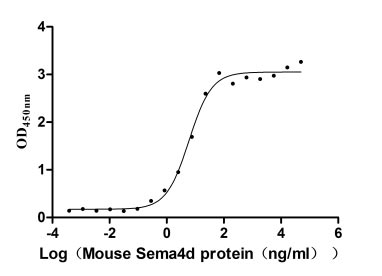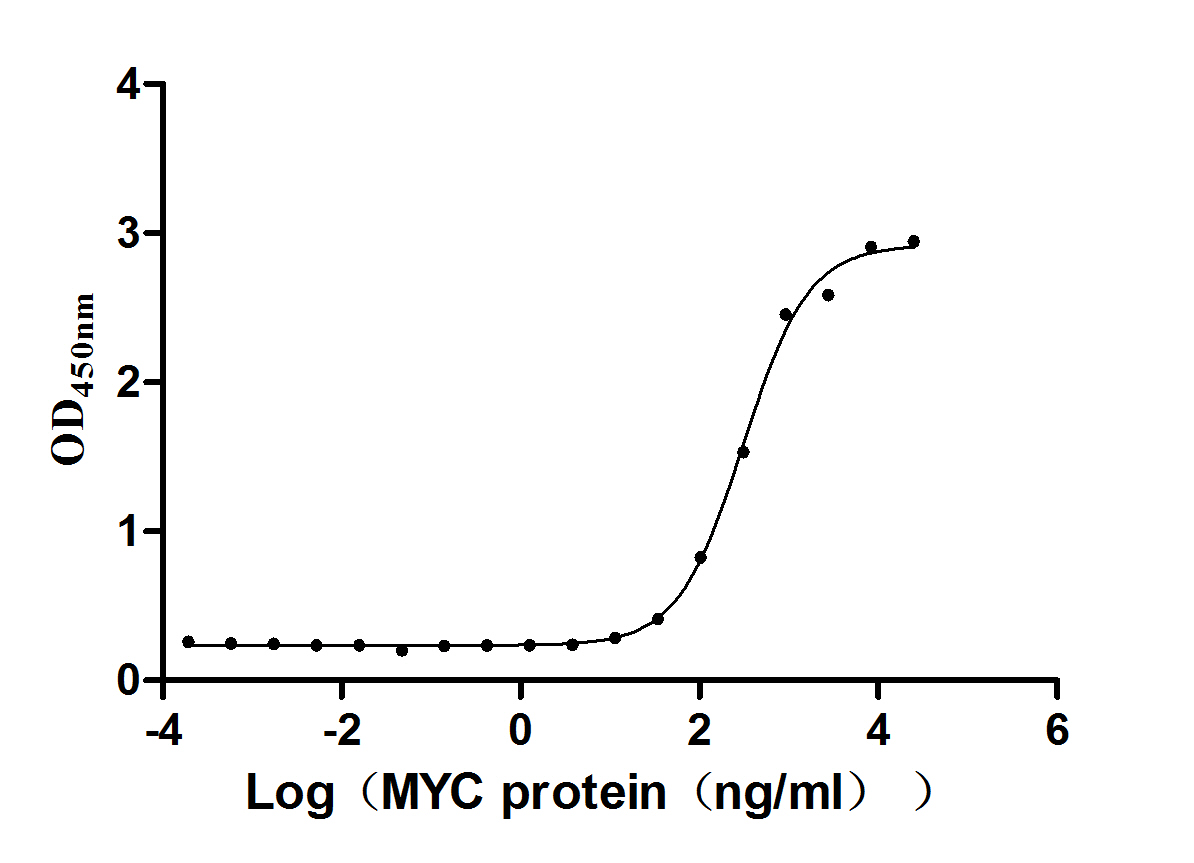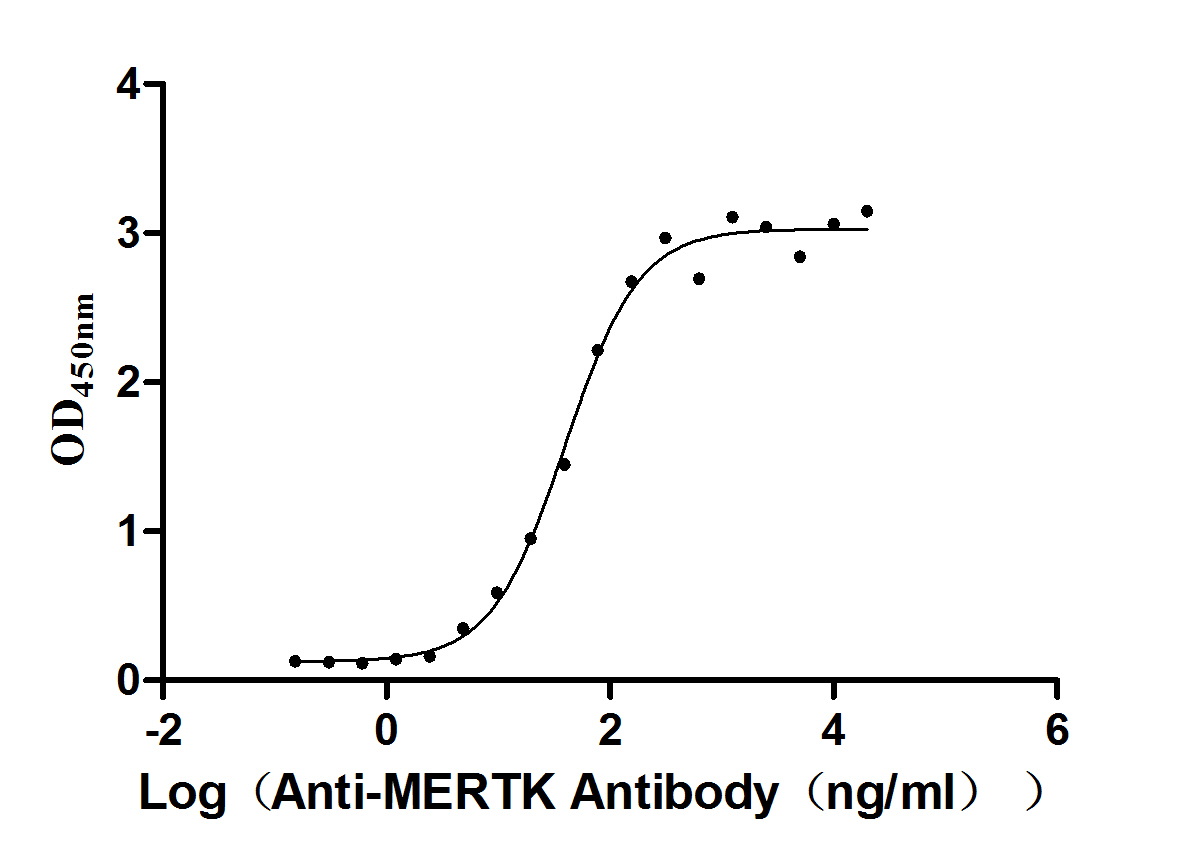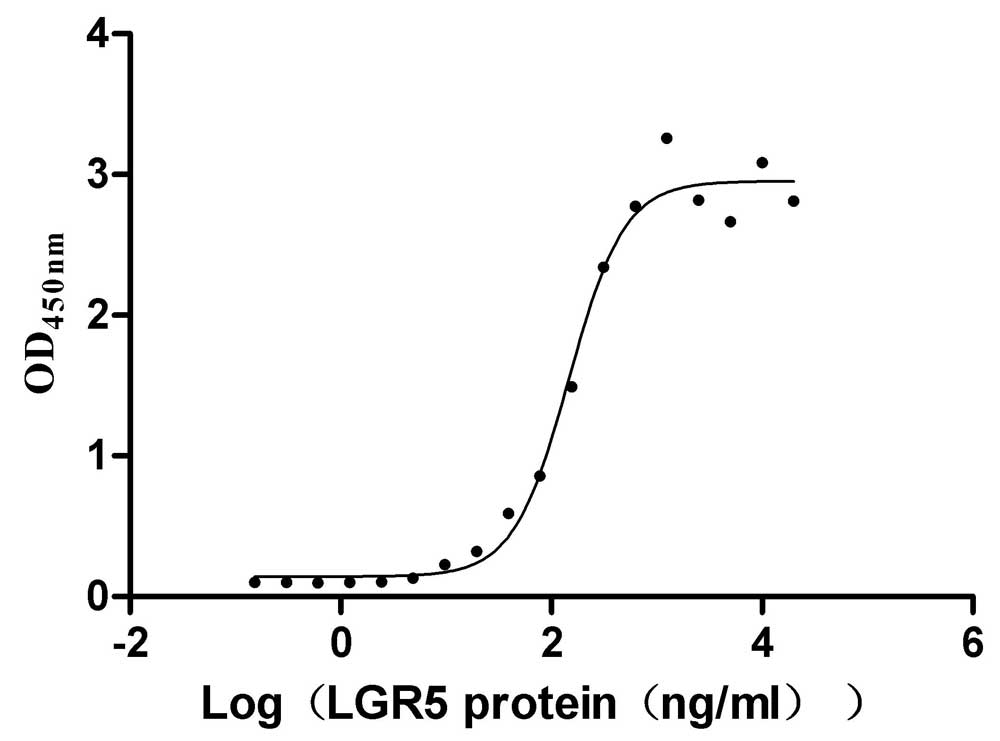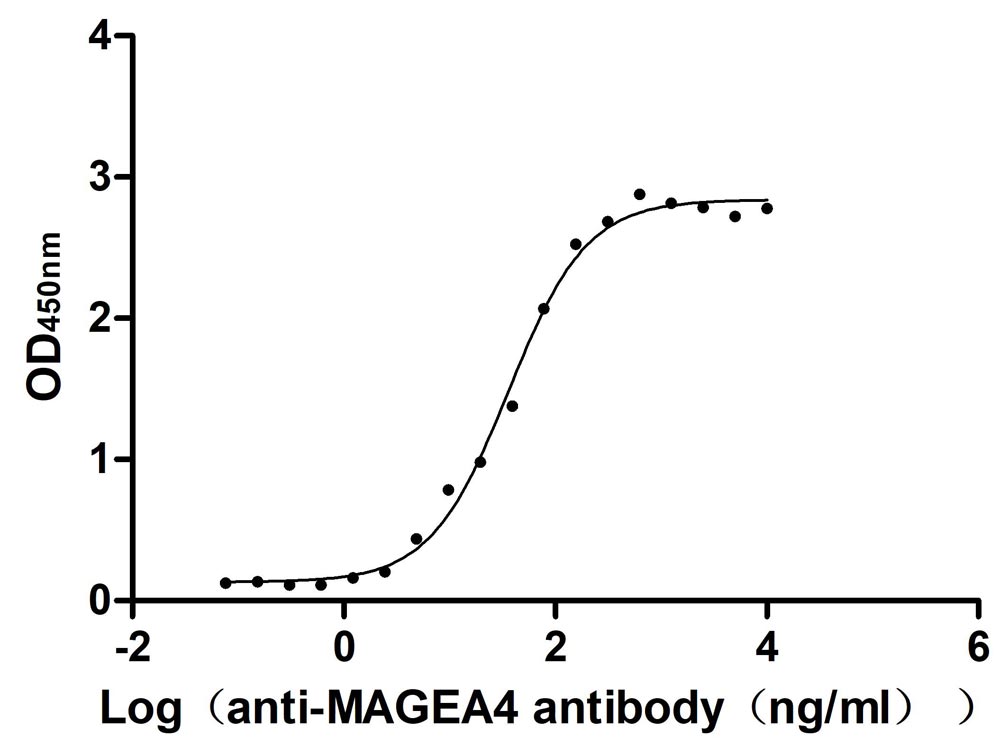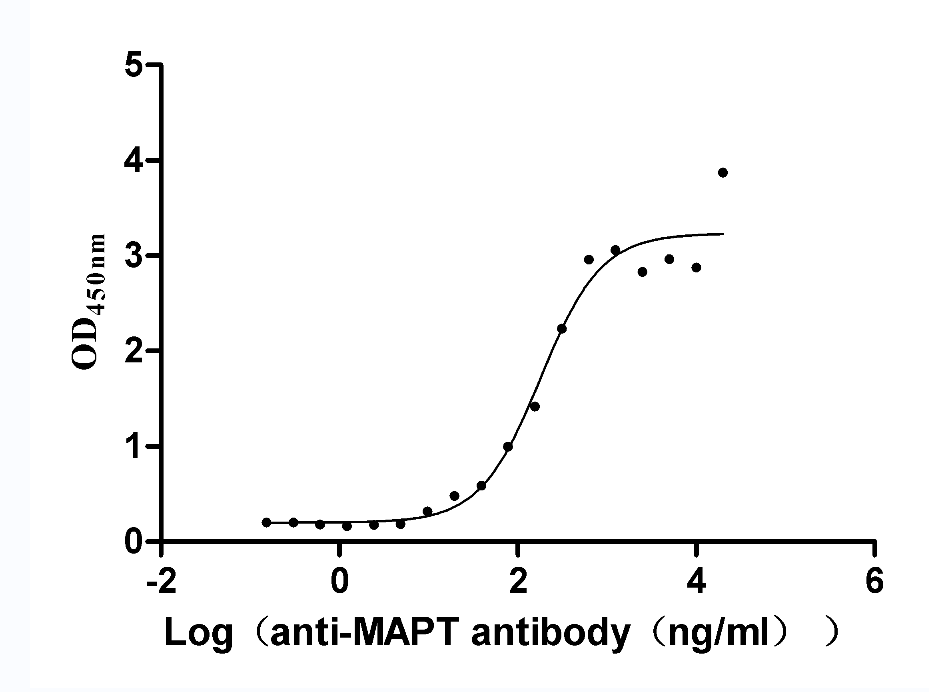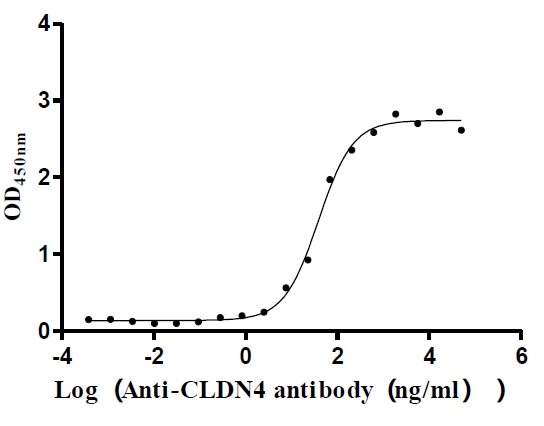Recombinant Mouse Battenin (Cln3), partial
-
货号:CSB-YP733773MO
-
规格:
-
来源:Yeast
-
其他:
-
货号:CSB-EP733773MO
-
规格:
-
来源:E.coli
-
其他:
-
货号:CSB-EP733773MO-B
-
规格:
-
来源:E.coli
-
共轭:Avi-tag Biotinylated
E. coli biotin ligase (BirA) is highly specific in covalently attaching biotin to the 15 amino acid AviTag peptide. This recombinant protein was biotinylated in vivo by AviTag-BirA technology, which method is BriA catalyzes amide linkage between the biotin and the specific lysine of the AviTag.
-
其他:
-
货号:CSB-BP733773MO
-
规格:
-
来源:Baculovirus
-
其他:
-
货号:CSB-MP733773MO
-
规格:
-
来源:Mammalian cell
-
其他:
产品详情
-
纯度:>85% (SDS-PAGE)
-
基因名:Cln3
-
Uniprot No.:
-
别名:Cln3Battenin; Protein CLN3
-
种属:Mus musculus (Mouse)
-
蛋白长度:Partial
-
蛋白标签:Tag type will be determined during the manufacturing process.
The tag type will be determined during production process. If you have specified tag type, please tell us and we will develop the specified tag preferentially. -
产品提供形式:Lyophilized powder
Note: We will preferentially ship the format that we have in stock, however, if you have any special requirement for the format, please remark your requirement when placing the order, we will prepare according to your demand. -
复溶:We recommend that this vial be briefly centrifuged prior to opening to bring the contents to the bottom. Please reconstitute protein in deionized sterile water to a concentration of 0.1-1.0 mg/mL.We recommend to add 5-50% of glycerol (final concentration) and aliquot for long-term storage at -20℃/-80℃. Our default final concentration of glycerol is 50%. Customers could use it as reference.
-
储存条件:Store at -20°C/-80°C upon receipt, aliquoting is necessary for mutiple use. Avoid repeated freeze-thaw cycles.
-
保质期:The shelf life is related to many factors, storage state, buffer ingredients, storage temperature and the stability of the protein itself.
Generally, the shelf life of liquid form is 6 months at -20°C/-80°C. The shelf life of lyophilized form is 12 months at -20°C/-80°C. -
货期:Delivery time may differ from different purchasing way or location, please kindly consult your local distributors for specific delivery time.Note: All of our proteins are default shipped with normal blue ice packs, if you request to ship with dry ice, please communicate with us in advance and extra fees will be charged.
-
注意事项:Repeated freezing and thawing is not recommended. Store working aliquots at 4°C for up to one week.
-
Datasheet :Please contact us to get it.
靶点详情
-
功能:Mediates microtubule-dependent, anterograde transport connecting the Golgi network, endosomes, autophagosomes, lysosomes and plasma membrane, and participates in several cellular processes such as regulation of lysosomal pH, lysosome protein degradation, receptor-mediated endocytosis, autophagy, transport of proteins and lipids from the TGN, apoptosis and synaptic transmission. Facilitates the proteins transport from trans-Golgi network (TGN)-to other membrane compartments such as transport of microdomain-associated proteins to the plasma membrane, IGF2R transport to the lysosome where it regulates the CTSD release leading to regulation of CTSD maturation and thereby APP intracellular processing. Moreover regulates CTSD activity in response to osmotic stress. Also binds galactosylceramide and transports it from the trans Golgi to the rafts, which may have immediate and downstream effects on cell survival by modulating ceramide synthesis. At the plasma membrane, regulates actin-dependent events including filopodia formation, cell migration, and pinocytosis through ARF1-CDC42 pathway and also the cytoskeleton organization through interaction with MYH10 and fodrin leading to the regulation of the plasma membrane association of Na+, K+ ATPase complex. Regulates synaptic transmission in the amygdala, hippocampus, and cerebellum through regulation of synaptic vesicles density and their proximity to active zones leading to modulation of short-term plasticity and age-dependent anxious behavior, learning and memory. Regulates autophagic vacuoles (AVs) maturation by modulating the trafficking between endocytic and autophagolysosomal/lysosomal compartments, which involves vesicle fusion leading to regulation of degradation process. Participates also in cellular homeostasis of compounds such as, water, ions, amino acids, proteins and lipids in several tissue namely in brain and kidney through regulation of their transport and synthesis.
-
基因功能参考文献:
- Our subcellular localization study in neurons refines the localization and subcellular targeting of CLN3 to late endosomal-lysosomal compartments PMID: 27453211
- findings in two distinct lysosome-related degradative pathways constitute the first description of a deficit in the retinal pigment epithelium caused by loss of CLN3 PMID: 26450516
- The small GTPase Cdc42 is misregulated in the absence of CLN3, and thus may be a common link to multiple cellular defects. PMID: 24792215
- The aim of our study was to investigate the visual disease progression in the Cln3 (Deltaex7/8) mice. PMID: 24664736
- CLN3 facilitates transport of microdomain-associated proteins. PMID: 24227717
- results demonstrate altered glutamate receptor function in Cln3(Deltaex7/8) neurons and suggest that both AMPA and NMDA receptors are potential therapeutic targets in juvenile neuronal ceroid lipofuscinosis PMID: 21315126
- The migration defect in Cln3(-/-) results, in part, from the loss of the CLN3-myosin-IIB interaction. PMID: 20850431
- Findings suggest an osmoregulated role for CLN3p in renal medullary control of water and K(+) balance. PMID: 20219947
- Cln3(Deltaex7/8) knock-in mice with the common juvenile-onset neuronal ceroid lipofuscinosis (JNCL; Batten disease) mutation exhibit progressive neurologic disease that begins before birth. PMID: 12374761
- we investigated endogenous Cln3p expression using two peptide antibodies raised against two distinct epitopes of murine Cln3p. PMID: 14622109
- CLN3 defect may result in altered mitochondrial function in eye but not other tissue. PMID: 15326100
- The Cln3 null mutant (Cln3(-/-)) mouse model of juvenile NCL (JNCL) that revealed a delayed onset neurodegenerative phenotype with no significant regional atrophy, but with widespread loss of hippocampal interneurons that was at 14 months of age. PMID: 15374749
- AP-1 and AP-3 facilitate lysosomal targeting of Batten disease protein CLN3 via its dileucine motif PMID: 15598649
- Cnl3 mutant mice revealed a pronounced loss of neurons within individual laminae of somatosensory cortex of affected mice and the novel finding of a loss of sensory relay thalamic neurons. PMID: 16006136
- cln3 has a role in pathology of Batten disease, as shown by NMR metabolomic analysis of the mouse model PMID: 16239221
- Having previously demonstrated that Cln3(-/-) mice have decreased optic nerve axonal density, we now demonstrate a decrease in nerve conduction. PMID: 16412658
- Vulnerability of CLN3 knock-out or CLN3 deletion (1-153)-expressing neuronal cells to Ca(2+)-induced cell death may be mediated by calsenilin. PMID: 17189291
- This study provides evidence for early changes in the kinetics of COMT in the Cln3(-/-) mouse striatum, affecting the turnover of dopamine, likely leading to neuron loss and motor deficits. PMID: 17617387
- Cln3 knockout mouse model. Progressive accumulation of autofluorescent storage material was observed in brain and retina of affected mice and had significantly shortened life spans. PMID: 17962032
- Report of a heterozygous abnormality in Batten disease. PMID: 17962056
- CLN3p impacts galactosylceramide transport, raft morphology, and lipid content. PMID: 18317235
- analysis of expressed Cln3(Deltaex1-6) mouse transcripts, combined with in silico prediction of the expected consequences of the Cln3(Deltaex1-6) mutation on these transcripts, aberrant Cln3 proteins are unlikely to be expressed in this disease model PMID: 18678598
- Overall, this study defines a novel multi-faceted, early-onset cerebellar disruption in the Cln3 null brain, including glial activation, cell loss, and aberrant cell proliferation and differentiation. PMID: 19230832
- This study reveals previously overlooked behaviour deficits in neonate and young adult Cln3(Deltaex7/8) mice indicating neurodevelopmental delay as a putative novel component of JNCL. PMID: 19243453
显示更多
收起更多
-
亚细胞定位:Lysosome membrane; Multi-pass membrane protein. Late endosome. Lysosome. Membrane raft. Golgi apparatus, trans-Golgi network. Cell junction, synapse, synaptosome. Early endosome membrane. Late endosome membrane. Cytoplasmic vesicle, autophagosome.
-
蛋白家族:Battenin family
-
组织特异性:Expressed throughout the brain, such as, in the cerebral cortex, hippocampus, cerebellum and several different cerebral nuclei (at protein level). In the cerebral cortex, expressed in all cortical layers. In the hippocampus, expressed in the granule cells
-
数据库链接:
KEGG: mmu:12752
STRING: 10090.ENSMUSP00000032962
UniGene: Mm.268930
Most popular with customers
-
Recombinant Human Tumor necrosis factor ligand superfamily member 8 (TNFSF8), partial (Active)
Express system: Mammalian cell
Species: Homo sapiens (Human)
-
Recombinant Mouse Semaphorin-4D (Sema4d), partial (Active)
Express system: Mammalian cell
Species: Mus musculus (Mouse)
-
Recombinant Human papillomavirus type 16 Protein E7 (E7) (Active)
Express system: E.coli
Species: Human papillomavirus type 16
-
Recombinant Human Tyrosine-protein kinase Mer (MERTK), partial (Active)
Express system: Mammalian cell
Species: Homo sapiens (Human)
-
Recombinant Human R-spondin-1 (RSPO1), partial (Active)
Express system: Mammalian cell
Species: Homo sapiens (Human)
-
Recombinant Human Melanoma-associated antigen 4 (MAGEA4) (Active)
Express system: Mammalian cell
Species: Homo sapiens (Human)
-
Recombinant Rat Microtubule-associated protein tau (Mapt) (Active)
Express system: Mammalian cell
Species: Rattus norvegicus (Rat)
-
Recombinant Human Claudin-4 (CLDN4)-VLPs (Active)
Express system: Mammalian cell
Species: Homo sapiens (Human)



